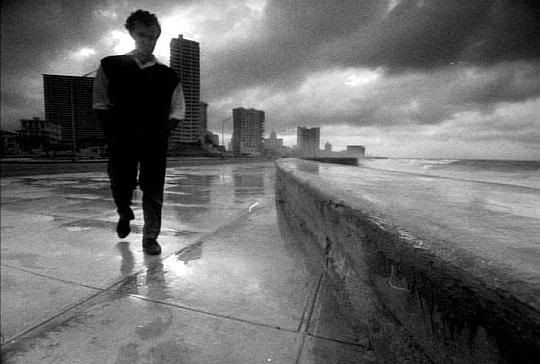
Σάββατο 26 Σεπτεμβρίου 2009
RIDE THE PINK HORSE (1947, ROBERT MONTGOMERY)

Δευτέρα 21 Σεπτεμβρίου 2009
EXTREME PREJUDICE (1987, WALTER HILL)

You know the movie. Drugs across the Southwest border, Texan desert landscapes, sweaty faces, dusty gas stations in the middle of nowhere, money exchanging hands and gone missing somewhere along the way, maybe a bank robbery. It's that distinctly American type of crime movie given character and come alive by the beautiful western setting, a modern update of sheriffs and Mexican outlaws and doublecrossing between old friends now on opposite sides of the law that goes as far back as Boetticher's films, done with a focus on high-octane no-holds-barred action cut straight from Sam Peckinpah's school of blood squibs and slow-mo gunfights. The story isn't half-bad but Walter Hill has always been an action nut first and foremost and John Milius was never Cormac McCarthy, so you'll forgive Extreme Prejudice for not quite being NO COUNTRY FOR OLD MEN. It's still a good movie, not very surprising plot-wise truth be told, with a WILD BUNCHesque finale and some nice dialogue exchanges along the way, a crabby Rip Torn as the old sheriff mentor and Nick Nolte looking mean and badass for most of the film, and if it's let down in the acting department every now and then when some emoting is required, that's because both Michael Ironside and Powers Boothe playing the villains were never the greatest of actors. The low 6.2 rating the movie has on IMDb as of this posting tells me the movie has suffered at the hands of sleepy viewers catching it randomly on late night TV in crappy pan-and-scan versions or indifferent video club patrons renting it on VHS for the vaguely familiar hovering heads on the cover and the promise of things exploding. This is not THAT kind of movie. It's an action film but it has character and style that will be appreciated more by that niche audience comprising of fans of action movies and 70's gritnik crime cinema, the kind of substratum Walter Hill proudly inhabited in the 70's with films like THE DRIVER. Watching the remastered widescreen copy I saw, I think that audience will have very different things to say. Hell, just take a look at that poster up there and tell me it doesn't look like it belongs to a 70's movie.
Κυριακή 20 Σεπτεμβρίου 2009
CAIRO STATION (1958, YOUSSEF CHAHINE)

I AM CUBA (1964, MIKHAIL KALATOZOV)

Few movies are as legendary as Soy Cuba in how ahead of their time they were, prophets bearing visions from a cinema almost unthinkable at the time in the US for anyone whose name wasn't Welles (and, by the time Soy Cuba came out, Welles had been all but banished from the US and forced to pine for his movies in Europe), few such faith-restoring Holy Grails for the sheer visual power of cinema. My usual problem with Kalatozov, this time amplified by the propaganda nature of a film comisssioned by Castro's Cuba from its newfound Soviet allies and filmed by Soviet crews from Mosfilm Studios on location in Cuba, is that his subject matter keeps me at a distance. But at the same time, what dazzling displays of cinematic fireworks his movies are! No one films a clouded sky like his DP, Sergei Urusevsky, with that pristine quality dreamlike and supine, and no one has ever made a camera seem more alive dynamic and freewheeling than you'll find in Kalatozov's movies. There were times the movie made me wonder in awe with jaw agape as to where the camera was mounted, how it seemed to float in the air above a crowded street, having already tracked up four stories and across the street and through a room and out the balcony, hovering suspended in the air as though by an act of sheer cinematic will, amazing if just for the blocking and coordination it would have required. As someone who's indifferent/opposed to Communism on a practical level, Soy Cuba's best case for the power of collective strength does not come through in the agitprop subject matter, the onedimensional depiction of hard edged patriotic Cuban guerillas fighting against all odds and oppressed peasants having their land stolen by rich landowners and student radicals rioting in the streets against the fascist police and being shot down by them, this in itself borderline succesful not because it imitates real life because a propaganda piece cannot replicate real life but because it imitates melodrama we're already vaguely familiar from other movie plots; Soy Cuba's best showcase of Soviet will comes in the amazing cooperation it must have taken to make the camera move the way it does. If Soy Cuba is a celebration of Communist ideals, a failure as a narrative because of the intellectual dishonesty necessary in concocting a propaganda film, it's also a celebration of amazing cinema, a success despite itself, not for plot drama or characters, but for the simple joy of staging beautiful elaborate images, for the amazing camerawork, for the stark black and white cinematography, a lot of it self-indulgent, the camera moving for the sake of movement and the joy of it, the actors treated as little more than walking props the camera can circle around and play against. In many ways, Soy Cuba is a study in choreography for camera and blocking. When Kalatozov introduces a blurry dreamlike flashback it seems to swim out of the head of the character who experiences it. When the same character torches his own cane field, Kalatozov orchestrates a vision of hell, the camera itself dancing through swirling flames and billows of black smoke. I can't really praise the visuals enough. As with other Kalatozovs, the story prevents me from tenning it, but from a technical standpoint, this will blow your mind.
Κυριακή 6 Σεπτεμβρίου 2009
INGLOURIOUS BASTERDS (2009, QUENTIN TARANTINO)

IB is a difficult movie for me to criticize because it does nothing Kill Bill didn’t do first and yet I loved Kill Bill. It does what Death Proof and its talky riot grrl trashy aesthetic did but does it better and yet clocking at 150 minutes it’s more tiresome than Death Proof. It’s a man’s movie done by a gleeful adolescent. It has interesting characters like Aldo Rain and Colonel Landa but wastes them in the wrong movie. It’s a movie about QT’s wild feverish love of cinema and yet it’s a love of cinema reduced to incognito winks and nods and references aimed to satisfy the hardened cinephile who can smirk at himself bemused at identifying Emil Jannings and Antonio Margheriti instead of a love of cinema for its ecstatic combination of images and sounds, for that transcendental sum so greater than its individual parts which QT himself praised in Leone’s GBU.
The movie vacillates between the banal (a Basterd shooting a wounded Nazi prison guard after he groans) and the tedious (the love subplot between Jewish girl and Nazi war hero) capping that off with wild explosions of violence. It is outrageous as much for its irreverent cartoonish treatment of a horrible war as it is for expecting the viewer to accept every improbable silly plot twist (Hitler Goering Goebbels and Bormann all attending a movie premiere in occupied Paris, Landa’s defection) for the very reason they’re cartoonish and irreverent. Much like a dead baby joke, IB’s clever set up requires you to accept its silly outrageous premise for the very qualities that mark it as such, otherwise you’re not in on the joke. And much like a failed dead baby joke, IB fails in that aspect because it doesn’t push the boundaries of decency far enough, because this is a movie about a band of US scalphunters facing off with a charming but horrifying Nazi villain in occupied France saddled with a lifeless heroine who polishes Henri-Georges Clouzot’s name in the marquee of her cinema and needless distracting Mike Myers cameos stretching out the tightness of the plot, because it must stop on its tracks to explain how inflammable nitrate stock is (dramatize dramatize dramatize!) and drop references to Hollywood moguls Louis B. Mayer and David Selznick, because IB is a movie about QT making a movie, insulated from reality archetype or myth, vicariously presenting love grief and loss not through real life but through other movies about love grief and loss, because unlike the best of cinema IB’s parts are greater than the whole, set pieces lovingly constructed, their verbosity undercut with slow-burn suspenseful tactics, strung together to support a flimsy plot.
Watching IB reminded me of how I got my first movie ideas: I would drive around listening to rousing music (Morricone often enough) and I would imagine scenes to go with the music, set pieces, cool shots, openings and closings. But writing a story requires to turn off the music and put pen to paper, not to fill the mouths of your characters with fancy dialogues, but to layer and structure and hold back when necessary and invest in subtext and dramatize not with regards to small climaxes every twenty minutes of splinters of wood exploding, gunfights in basement tavers, and cinemas erupting in flames, followed by whole slabs of exposition (like the Basterds introduction), but one slow and steady climax of character and action.
This vacuous patchwork of quirks and eccentricities reflected in the title itself, rightfully INGLOURIOUS BASTERDS and not Once Upon a Time in Nazi-Occupied France as QT intended it to be at first, because in Sergio Leone’s OUATITW, the patchwork of film references created by young cineliterate writers Argento and Bertollucci is subordinate to the story, layered inside, used as tools to expose myth and archetype, whereas in IB they’re applied externally as quirks independent of the story. QT did the same thing in Kill Bill but there he had the wherewithal to reward both the genre fan who picked up on the Lady Snowblood/Sex and Fury homage and the casual moviegoer who didn’t with great cinema, because he introduced Sonny Chiba as Hattori Hanzo (after the famous TV series) but made him a believable character. Occasionally funny, with a good opening sequence, an outrageous climax, and a charismatic scene-stealing villain, IB suffers because there’s too much QT in the movie. If every movie is a ride through the artist’s world, IB is a carnival tour through QT’s bedroom because he never left it to see the world, with QT as host pointing out at his one obsession: his love of movies.
As it is, I rate Enzo G. Castellari's original INGLORIOUS BASTARDS higher than QT's homage, not necesserily because it's a better movie, but because it holds up better as a whole. Still, QT's ferociously publicized name guarantees IB will be one of the movie events of the year.
Τρίτη 1 Σεπτεμβρίου 2009
GEORGE WASHINGTON (2000, DAVID GORDON GREEN)




